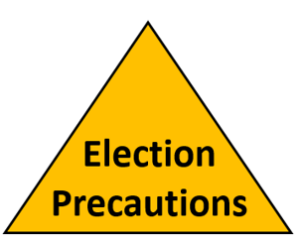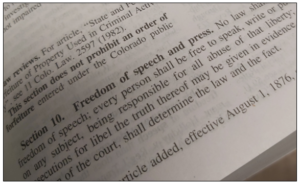Editor’s note: This article was originally written by Bob Lackner and posted on March 24, 2022. This version has been updated where appropriate.
Use of House and Senate legislative staff, equipment, and resources
Perennial questions arise concerning the possible use of state equipment or state buildings and the use of staff time for political purposes, namely a member’s reelection efforts and related advocacy activities on behalf of the member’s political party or other candidates for partisan office. These questions naturally tend to be more pressing in election years when legislators are often pulled between their official legislative duties and critical political tasks necessary to ensure reelection for themselves or other candidates of their political party.
There is not much law that provides clarity on most questions in this area. The most concrete guidance is a statute that prohibits, among other things, a state agency, including the General Assembly, from making any contribution in campaigns involving the nomination, retention, or election of any person to public office. [1] A violation of this section subjects the offender to sanctions including an order directing the person making the contribution to reimburse the fund of the state from which the moneys were diverted for the amount of the contribution. [2] Over the years, the Office of Legislative Legal Services  (Office) has recommended that the wisest default position for legislators, partisan staff, and House and Senate employees is to avoid, to the greatest extent practicable, the use of Capitol office space, public resources, or staff time for political campaign activity of a partisan nature. Following this advice may avoid an ethics complaint being filed. We have come to publicize this advice in terms of the “Three Nos.” Specifically:
(Office) has recommended that the wisest default position for legislators, partisan staff, and House and Senate employees is to avoid, to the greatest extent practicable, the use of Capitol office space, public resources, or staff time for political campaign activity of a partisan nature. Following this advice may avoid an ethics complaint being filed. We have come to publicize this advice in terms of the “Three Nos.” Specifically:
- No Capitol space: With one limited exception as noted below, rooms in the Capitol building, including private offices, should not be used to carry out political campaign activity.
- No equipment: State-funded equipment and other related resources for the use of members of the General Assembly and their staff in fulfilling their official duties, including desktop and laptop computers, tablets, telephones, fax machines, copier machines, paper products, office supplies, and internet connectivity, should not be used to carry out political campaign activity.
- No staff: Staff for elected officials should not be using their time for which they are paid to assist the member in carrying out the member’s official legislative duties to carry out political campaign activity. Staff is permitted, however, to engage in political campaign activity in their free time while “off the clock”, outside the Capitol building, and without the use of state resources.
With respect to the Capitol building, there has been an accepted practice over many years of legislators using photographs of the legislator from inside the building for use in campaign materials. A popular setting for the use of such a photograph is from the House or Senate floor. In more recent years, the photograph is often displayed on the candidate’s website or for use in social media. As long as the photograph does not include the state seal or the seal of either the State Senate or the State House of Representatives, this practice has been permitted as a narrow exception to the general rule against political activity within the state Capitol.
Some of the other perennial questions in this area include:
- May House or Senate legislative staff, equipment, or resources be used during regular business hours to arrange “town hall” meetings on behalf of a member of the General Assembly? Legislative staff, equipment, or resources may be used during regular business hours to arrange a “town hall” meeting on behalf of a member of the General Assembly as long as the meeting relates exclusively to the legislator’s official duties—that is, legislation, a discussion of state issues, policymaking, etc.—and the legislator or staff do not engage in political activity relating to the election of a candidate. Similarly, staff may use state equipment during business hours to communicate with constituents on legislative matters on behalf of members as long as the communications are not for campaign or political purposes.
- May political literature be handed out at a town hall meeting held in connection with a member’s official duties? This practice is not advisable. If the town hall meeting is held for the purpose of communicating with the public about legislative business, it should not be coupled with any activity, such as handing out campaign literature, that suggests a political purpose.
- May House or Senate legislative staff maintain a legislator’s website that is predominantly devoted to legislative activities but that also contains some content that could be characterized as political or campaign-related? The member and staff should remain conscious of the fact that the line between what is legislative and what is political in the context of written or electronic communications oftentimes becomes blurred. Accordingly, when staff uses state time or resources to generate materials that appear, or might be construed, to be created or used for a campaign or political activity or purpose, the likelihood of a complaint is greater.
May House or Senate partisan staff undertake political activity on the weekend or at night when the staff person may also be engaged in work on official legislative business? Yes. The boundary between time that may be spent on official legislative duties and time spent on political activity is essentially governed by the staff person’s official legislative work schedule. The staff person needs to refrain from undertaking political activity while on the legislative clock.
[1] §1-45-117 (1)(a)(I), C.R.S.



